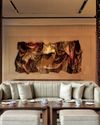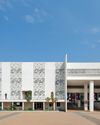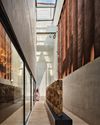A visit to Melbourne no doubt makes you feel that it is a part of a country whose economy is said to have one of the fastest economic growth rates in the developed world.

Although the Aboriginal and Torres Strait Islander people are the original inhabitants, the city and country has migrants from over 200 countries. The second largest city of Australia, Melbourne is a fast evolving and exciting metropolis which witnesses an eclectic blend of nineteenth and early twentieth century architecture to the contemporary international style of design. Located in the State of Victoria, it enjoys all the benefits of being its coastal capital with some luring beaches with colourful bathing cabins as they are called. A city having been attuned to a traditional past, is today responding with an energised city planning configuration that caters to the changing demands of the day, whether it is in lifestyle, cultural activity, sports or then education. A tourist-friendly city, Melbourne has a well-organised public transport system – buses, trams, taxis and the metro rail, which surprisingly is not connected to the international airport. There are certain zones where the trams are free to travel in, thus making commuting hasslefree with the jump-in and jump-off flexibility.
Melbourne’s heritage is worth a probe. The journey from a tent city to the present has a lot of history stored in the buildings that came up over the decades. A heritage walk in the Royal Botanical gardens brings you closer to the beliefs of the ancestors of this land. There is a 15-year heritage strategy plan to protect the identified buildings and complexes. Amongst the many that have been declared as ‘heritage sites’ are the Royal Exhibition Building, the Old Melbourne Gaol, the Shrine of Remembrance, Parliament of Victoria, Cook’s Cottage and such others which make a statement of the culture and life of the bygone days. The good part is that all these buildings are well protected and maintained.
Denne historien er fra January 2017-utgaven av Architecture + Design.
Start din 7-dagers gratis prøveperiode på Magzter GOLD for å få tilgang til tusenvis av utvalgte premiumhistorier og 9000+ magasiner og aviser.
Allerede abonnent ? Logg på
Denne historien er fra January 2017-utgaven av Architecture + Design.
Start din 7-dagers gratis prøveperiode på Magzter GOLD for å få tilgang til tusenvis av utvalgte premiumhistorier og 9000+ magasiner og aviser.
Allerede abonnent? Logg på

A RIVERSIDE SANCTUARY OF DESIGN AND ART
Perched along the Chao Phraya River, Capella Bangkok is an urban sanctuary crafted by Hamiltons International and BAMO, with art by Thai textile artist Ploenchan 'Mook' Vinyaratn-blending with Bangkok's cultural heartbeat to offer an experience that is both timeless and refined
THE SPORTING ICON
A manifesto of potential written in zinc, concrete, and imagination, this university sports arena showcases how thoughtful, innovative architecture can transform urban landscapes and foster a culture of excellence

NATURE NURTURES LEARNING
Blending sustainability with innovative design, Morphogenesis' Vidyashilp Academy redefines educational spaces, fostering holistic development amidst Bengaluru's lush greenery

ME EPICENTER OF ART AND CULTURE
Arthshila at Okhla endeavours to epitomize the essence of exhibition spaces within the context of Delhi

SAKA MUSEUM: BRIDGING SILENCE, HERITAGE, AND DESIGN
From the celestial glow of its lobby to the grounded textures of volcanic rock, the SAKA Museum is a masterclass in thoughtful, place-based design. Under the vision of Wesley Ho, co-founder of the Hong Kong-based firm Napp Studio & Architects, this design-forward museum has evolved into a living, breathing narrative of Bali's identity

SCHUECO INDIA INAUGURATES ITS INDIA WELCOME FORUM IN DELHI NCR
A celebration of innovation, sustainability, and luxury in architecture

PIONEERING DESIGN EDUCATION FORA BETTER WORLD
To commemorate the 10th Anniversary of The Design Village - India's first social design school, we talk to the leadership at the institute that carries its pioneering vision of education for social impact, winning the Don Norman Design Recognition for humanity-centered design, representing the Global South.

DIVIANA DEBUTS IN MILAN: A Landmark In Indian Luxury Design
In an extraordinary milestone for Indian luxury and design, DIVIANA, a premier Indian luxury furniture brand, has opened its first European flagship showroom in Milan's prestigious Montenapoleone District, at Via Monte di Pietà 13/1. This 3200 sq. ft. space seamlessly blends the rich heritage of Indian craftsmanship with the refined aesthetics of Italian design, establishing a bold new narrative for global luxury.

THE MASTER BUILDER
Architect Ayan Sen is committed to pushing the boundaries of design and innovation.

MASTERING THE ART OF DESIGN
In a candid chat with A+D, Nieves Contreras, Creative Director, Lladró speaks about her innate passion for design and her love for craftsmanship